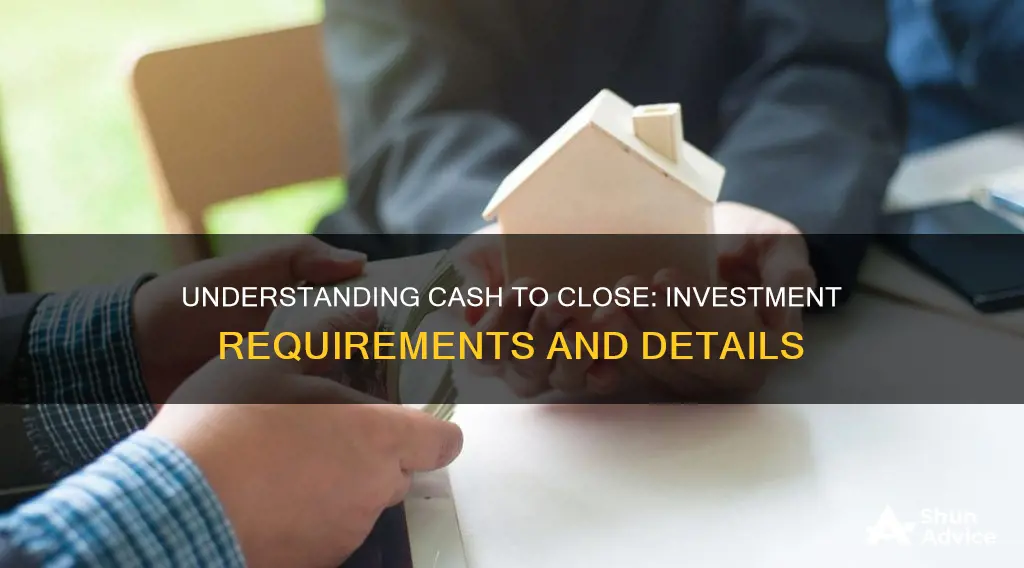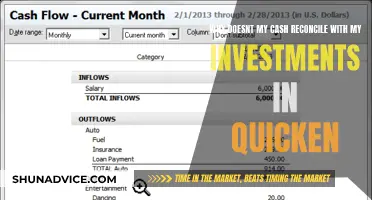
Cash to close, also known as 'funds to close', is the total amount of money a homebuyer needs to pay on the day of closing to finalise their home purchase. This includes the down payment, closing costs, and prepaid expenses such as homeowner's insurance and property taxes. Buyers should carefully review their closing disclosure and consult with their real estate attorney or settlement agent to confirm the total amount needed. The cash to close must be paid out-of-pocket and cannot be included in the mortgage loan.
| Characteristics | Values |
|---|---|
| Definition | The total amount of money you’ll need to pay on closing day to finalize your home purchase or real estate transaction. |
| Synonyms | Funds to close |
| What it includes | Down payment, closing costs, prepaid expenses (e.g. homeowner’s insurance, property taxes) |
| What it doesn't include | Mortgage loan |
| How to calculate it | (Down Payment + Closing Costs) − (Deposits And Credits) = Total Cash-To-Close Amount |
| How to pay | Wire transfer, cashier’s check, certified check, debit card, credit card, personal check, cash |

Closing costs
- Application fee: Charged by the lender to process a mortgage application.
- Attorney fee: Charged by a real estate attorney to prepare and review home purchase agreements and contracts.
- Closing fee: Also known as an escrow fee, this is paid to the closing company.
- Courier fee: Paid for the transportation of paper documents.
- Credit report fee: Charged to pull credit reports from the three major credit bureaus.
- Escrow deposit: Some lenders require a deposit of two months of property tax and mortgage insurance payments into an escrow account.
- Flood determination and monitoring fee: Paid to a certified flood inspector to determine if the property is in a flood zone, requiring flood insurance.
- Homeowners insurance: Evidence of a prepaid homeowners insurance premium.
- Lead-based paint inspection: Paid to a certified inspector to determine if the property has hazardous lead-based paint.
- Title insurance: Paid to the title company to protect the lender and buyer in case of an ownership dispute or lien that wasn't found in the title search.
- Origination fee: Covers the administrative costs to process a mortgage and is typically around 1% of the loan amount.
- Pest inspection: Covers the cost of a professional pest inspection for termites, dry rot, or similar damage.
- Points: Also known as discount points, these are an optional upfront payment to the lender to reduce the interest rate on a loan.
- Prepaid interest: Interest that accrues on a loan between closing and the date of the first mortgage payment.
- Private mortgage insurance (PMI): Required when the down payment is less than 20%. A month of PMI may be mandated at closing.
- Property appraisal fee: Charged to assess the home's fair market value.
- Property tax: All local property taxes incurred within 60 days of the home purchase.
- Recording fee: Charged by the city or county for recording public land records.
- Survey fee: Charged by a surveying company to confirm a property's boundaries.
- Title search fee: Charged to analyse property ownership records.
- Transfer tax: Tax levied by the state or local government to transfer the title from the seller to the buyer.
- Underwriting fee: Charged by the lender to verify the buyer's financial information, income, employment, and credit for final loan approval.
The closing costs can vary depending on the location and the property value. In the United States, homebuyers typically pay between 3% and 6% of the purchase price in closing costs. For example, for a $300,000 property, closing costs can range from $9,000 to $18,000.
It's important to note that closing costs are different from cash to close. Closing costs are just one component of cash to close, which also includes prepaid expenses and the remaining portion of the down payment.
Invest Wisely to Buy Your Dream House with Cash
You may want to see also

Down payment
A down payment is the amount of money a homebuyer pays upfront to purchase a home. It is usually a percentage of the home's purchase price and varies depending on the type of loan being taken out.
For example, if a house costs $300,000 and the buyer makes a 20% down payment, they will pay $60,000 upfront. The down payment is a significant component of the cash-to-close amount, which is the total sum of money required to finalise a property purchase.
The down payment requirements may be lower if the buyer is taking out a government-backed loan, such as an FHA or VA loan. For example, a conventional loan may require a minimum down payment of 5% to 20% of the home's purchase price, whereas a VA loan may not require any down payment at all.
The down payment is paid directly from the buyer's own funds, which can include savings, gift funds, or other liquid assets. It is separate from the mortgage loan and is not financed in any way.
The down payment is a crucial aspect of the home-buying process, as it demonstrates to lenders that the buyer is financially prepared and able to afford the purchase. A higher down payment can also improve the buyer's debt-to-income ratio, as it results in a lower monthly mortgage payment. This, in turn, can lead to more favourable mortgage rates and terms from lenders.
Understanding Investment Impacts on Cash Flow Statements
You may want to see also

Prepaid expenses
In accounting, prepaid expenses are recorded as assets on the balance sheet because they represent future benefits. However, they are expensed at the time when those benefits are realised. Prepaid expenses are initially recorded as current assets, which are assets that a company plans to use or sell within a year. Over time, the value of prepaid expenses is expensed onto the income statement.
Company ABC purchases insurance for a 12-month period for $120,000 upfront. Company ABC will initially book the full $120,000 as a debit to prepaid insurance (an asset on the balance sheet) and a credit to cash. Each month, an adjusting entry will be made to expense $10,000 (1/12 of the prepaid amount) to the income statement through a credit to prepaid insurance and a debit to insurance expense. In the 12th month, the final $10,000 will be fully expensed, and the prepaid account will be zero.
Recording Cash Investments: A Step-by-Step Guide for Beginners
You may want to see also

Credits and refunds
Deposits and Credits
Deposits and credits are amounts you have already paid towards your home purchase. They include your earnest money deposit and any seller or lender credits. The earnest money deposit is a sum of money you put down to demonstrate your serious intent to purchase the home. It is held in escrow until closing, when it is put towards your down payment and closing costs. Seller credits are amounts the seller agrees to pay towards your closing costs, and lender credits are funds your mortgage lender may contribute to offset some of your closing costs. While these deposits and credits don't directly impact the cash-to-close amount, they do reduce the total sum of money you need to have ready for closing.
Refunds
Refunds for overpayments and other credits can also reduce the amount of cash you need to close. For example, if you have overpaid on certain fees or charges, you may receive a refund at closing, reducing the amount of cash you need to bring.
Negative Cash-to-Close
In some cases, the sum of your deposits, credits, and refunds may be higher than the total of your down payment and closing costs. In this situation, your cash-to-close amount will be negative, meaning you will receive money back at closing. This typically occurs when you have opted for lender credits, which increase your overall mortgage interest rate in exchange for lowering the amount owed at closing.
Calculating Cash-to-Close
To calculate your cash-to-close amount, you can use the following formula:
Down Payment + Closing Costs) − (Deposits + Credits) = Total Cash-to-Close Amount
By substituting the values you know, you can determine the total sum of money you will need to finalise your home purchase.
Understanding Non-Cash Investing and Financing Activities
You may want to see also

Payment methods
A wire transfer is a good option if you are unable to go to the bank in person before closing. However, it is important to double-check the address before sending the money, as wire transfers are not reversible.
A cashier's check is certified by your bank and includes security features such as signatures and watermarks that make counterfeiting difficult. Most lenders prefer cashier's checks over certified checks.
A certified check is signed by your bank or credit union, ensuring that you have sufficient funds in your account to cover the cost. The amount is then locked in your account until the check is cashed.
Although credit and debit cards may be accepted, they are not recommended as lenders need to know that you have the money ready in your account before they approve your loan. Credit card companies also tend to block large and unusual charges.
Property Investment: All-Cash or Mortgage?
You may want to see also
Frequently asked questions
Cash to close is the total amount of money you need to pay on the day you finalise your home purchase. It includes the down payment, closing costs and prepaid expenses such as homeowner's insurance, property taxes, etc.
Closing costs are just one component of cash to close. Closing costs refer to the fees you pay to your mortgage company to close on your home loan. Cash to close is the total amount – including closing costs – that you’ll need to bring to your closing to complete your home purchase.
You can calculate your cash-to-close amount using the following formula:
(Down Payment + Closing Costs) − (Deposits And Credits) = Total Cash-To-Close Amount
There are a few ways to pay your cash to close. More secure forms include cashier’s checks, certified checks and wire transfers. Credit cards, debit cards and personal checks might be accepted, but aren’t recommended.







